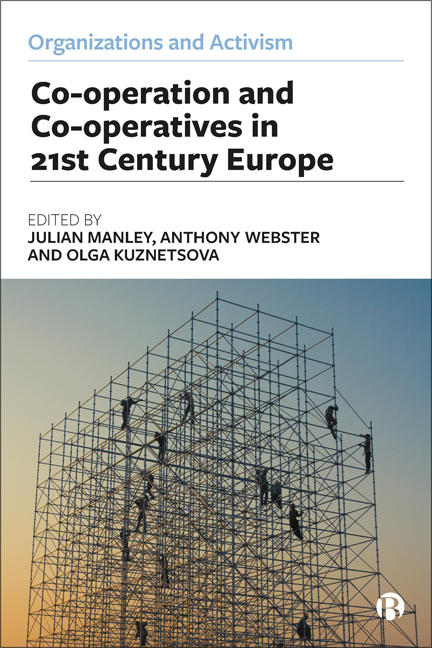Book contents
- Frontmatter
- Dedication
- Contents
- Series Editors’ Preface
- List of Figures and Tables
- List of Abbreviations
- Notes on the Contributors
- Acknowledgements
- Foreword
- 1 Introduction: European Co-operativism in a Changing World
- PART I Seeds: Identifying the Space for Co-operatives in Addressing Social Challenges
- PART II Bridges: Co-operative Culture and Education
- PART III Growth: The Preston Model, Co-operation and Community Wealth Building
- Index
1 - Introduction: European Co-operativism in a Changing World
Published online by Cambridge University Press: 28 March 2024
- Frontmatter
- Dedication
- Contents
- Series Editors’ Preface
- List of Figures and Tables
- List of Abbreviations
- Notes on the Contributors
- Acknowledgements
- Foreword
- 1 Introduction: European Co-operativism in a Changing World
- PART I Seeds: Identifying the Space for Co-operatives in Addressing Social Challenges
- PART II Bridges: Co-operative Culture and Education
- PART III Growth: The Preston Model, Co-operation and Community Wealth Building
- Index
Summary
Background to the book
The background to this book is an almost overwhelming and growing list of international tensions of various kinds: a pandemic, the climate emergency, the struggle for social justice as manifested in the Black Lives Matter movement, an alarming rise of extremist right-wing political positions, the politics of austerity, wage stagnation, growing inequalities, the refugee crises and, at the time of writing, the ‘cost of living’ crisis in Europe; all, combined with and partly as a result of the Russian military conflict with Ukraine, are causing serious social and economic uncertainties that bring into question previously held socio-economic expectations of citizens in 21st-century Europe. The present volume cannot hope to pretend to offer solutions to these multiple challenges, but nevertheless intends to present the reader with a consideration of the potential of co-operatives and cooperation as a means of reconstructing some of the damaged aspirations of the 20th century, as the 21st gets underway.
It is a premise of this book to argue that co-operatives per se are an important and globally relevant organizational form for business. They are an economic force with a wide-ranging social and economic imprint. In Europe alone, agricultural co-operatives process 60 per cent of all agricultural produce and there are 4,000 co-operative banks with 50 million members and a market share of 20 per cent (Dilger et al, 2017; Gouveia, 2012; World Coop Monitor, nd). The UK co-operative sector alone showed a £39.7 billion turnover in 2021, employed 250,128 people and had 13.9 million members (Co-op Economy, 2021). Over time, co-operatives have credibly established a reputation of organizations being most resilient to calamities and highly productive in pooling resources to achieve both economic and social value-driven outcomes (Roelants, 2013). Despite these facts, business and management literature often give the impression that co-operatives exist on the periphery of the modern economy and, as a result, the contribution of co-operatives to the GDP and their wide-ranging social imprint does not translate into a matching societal recognition (Develtere et al, 2008).
Information
- Type
- Chapter
- Information
- Publisher: Bristol University PressPrint publication year: 2023
